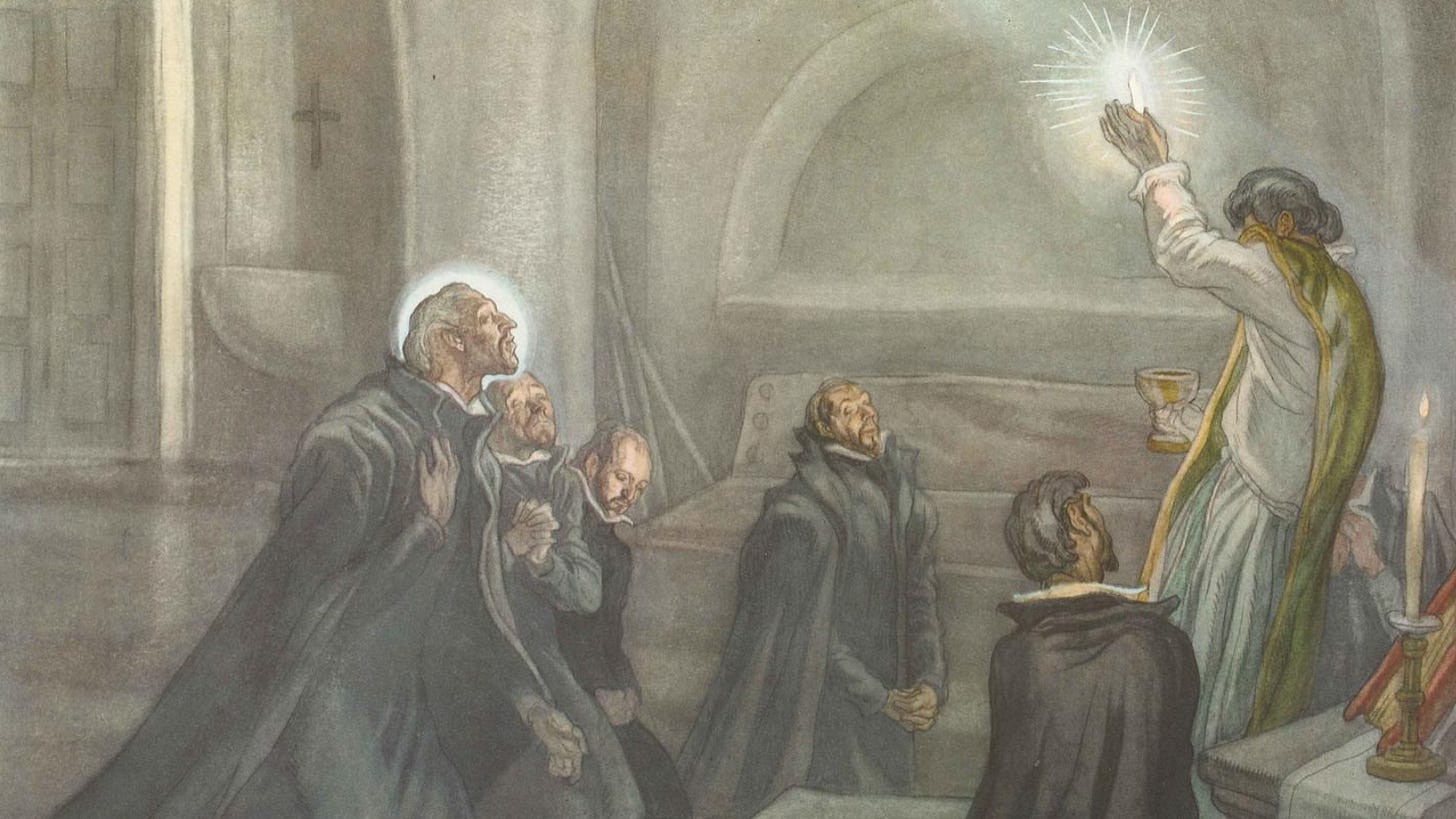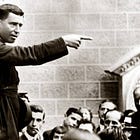‘One of the most effective means of regeneration’—Pius XII on the Spiritual Exercises
Pius XII praised Fr Vallet's ‘Work of Parish Exercises,’ which offered St Ignatius of Loyola's Spiritual Exercises to all, saying in 1948 that they corresponded to the needs of even modern men.

Pius XII praised Fr Vallet's ‘Work of Parish Exercises,’ which offered St Ignatius of Loyola's Spiritual Exercises to all—and said that the Exercises corresponded to the needs of even modern men.
Editors’ Notes
In 1948, Pope Pius XII addressed a pilgrimage organized by Fr Francisco de Paolo Vallet’s “Obra de Ejercicios Parroquiales” (Work of the Parish Exercises) of Spain.
Fr Vallet had taken up the gauntlet laid in Pius XI’s encyclical Mens Nostra. “The Work”—not to be confused with Opus Dei, who also use this nickname for themsleves—were focused on offering St Ignatius’ Spiritual Exercises to all Catholics, in a compressed form to allow for the constraints of daily life.
The pilgrimage was commemorating the pontifical approval of St. Ignatius' Spiritual Exercises and the silver jubilee of their organization. Pius XII praised their dedication to authentic Ignatian spirituality, attributing Spain's steadfast Catholic faith (and specifically the thousands of martyrdoms of the Spanish Civil War) to these parish-based retreats.
The Pope emphasized the continuing efficacy of the Spiritual Exercises, exhorting all to preserve their original method and cautioning against dilutions that compromise their spiritual potency.
These are strong words, which should cause a pause for thought amongst those who denigrate St Ignatius, his Exercises and his Jesuits for their supposed “excessive rationalism.”
Such critics should consider whether their preferred spiritual practices (which include falling asleep at shrines and practicising “theurgic magic”) have ever received such praise from any Roman Pontiff.
But of course, to those who have fallen into advocating such practices and denigrating St Ignatius, the praise of the Roman Pontiff does not hold great weight.
Discourse to a pilgrimage of ‘The Work of Parish Exercises of Spain’
Pope Pius XII
Sunday 24 October 1948
The Pilgrimage to Rome and the Legacy of St Ignatius
From the banks of the Urola and the Cardoner, most beloved children, and from other regions of Spain, you have come to the banks of the Tiber to conclude with us the commemorative celebrations of the pontifical approval of the Book of the Exercises of St Ignatius of Loyola, while at the same time solemnising the silver jubilee of your Work of Parish Exercises of Barcelona.
It is natural for the pilgrim of the Exercises to go to Loyola, to ascend to Montserrat, and to descend to Manresa, to visit the places sanctified by the conversion, the austerities, and the illuminations of the great Patriarch [St Ignatius]; but it is no less reasonable for him to come to Rome, as did Ignatius (and as St Francis Borgia desired to do)—perhaps limping and with his modest little book in his satchel—to cast himself at the feet of Our illustrious Predecessor Paul III and humbly to request the Church’s endorsement in favour of the little manual of Manresa.
What he was unable to accomplish personally, he achieved through his envoy in the Eternal City. The battles that those few and simple pages had provoked up to that moment would no longer have reason to be. Rome had spoken and had declared that “The Book” exuded piety and sanctity, was useful and beneficial; and therefore the Vicar of Christ approved, praised, and ratified it. More than thirty Supreme Pontiffs, in numerous documents, would repeat, more or less, the same; and we ourselves, when the occasion has arisen, have not failed to do likewise. Therefore, as we have been informed, you are now here to commemorate and give thanks for such solemn documents.
Spain’s Fidelity to the Exercises Amidst Persecution
Be, then, welcome; but know that your presence also has another aspect, which we might call complementary. You come to give thanks for these approvals; but, unwittingly, you also come to demonstrate that, judging by the fruits they have borne, they have been and continue to be most opportune.
For, indeed, what are you at this moment if not the representation of a profoundly Catholic people, whose perseverance in the faith—ardent and living—may perhaps also be explained, among other reasons, by the flourishing of St Ignatius’ Exercises in your native land? What are you—most beloved children of the Work of Parish Exercises of Barcelona—with your 63,000 exercitants and your 1,700 retreats in complete seclusion, if not the very body of an organisation that may be presented as a model of fervour and Christian life? How great was its value in the hour of trial, when, in the midst of persecution, your fidelity and your spirit of sacrifice were written with the blood of your heroic brethren! A fine fulfilment of the resolutions of the Exercises, demonstrated not in life, but in death!
The Enduring Power of the Ignatian Method
But your example also serves us to emphasise the efficacy of St Ignatius’ Exercises when fidelity to the spirit and the method is preserved, as, thanks be to God, happens among you. It is not true that the method has lost its efficacy or that it does not correspond to the demands of modern man. On the contrary, it is a sad reality that the liquor loses its strength and the machine its power when it is diluted in the colourless waters of over-adaptation or when certain fundamental parts of the Ignatian mechanism are dismantled. St Ignatius’ Exercises will always be one of the most effective means for the spiritual regeneration of the world and for its proper ordering, but on the condition that they remain authentically Ignatian.
You have traversed in Rome the places where the nascent Society of Jesus tested its first arms by giving the Exercises; you have prayed before the glorious tomb of their Author. And now, you have wished to gather around us, to console our afflicted paternal heart and to ask us for a blessing. May God bless you, as we bless you. And, at the invocation of our voice, may there descend from on high—through the intercession of the Saint who gave us the Exercises and of the many Saints whom the Exercises have given us—the choicest graces: graces of prosperity for your organisations, graces of fruitfulness for your apostolate, graces of sanctification for the Exercitants; and graces of peace and of all the goods that you desire for yourselves, for those you love, and for your most beloved homeland.
Discorsi e Radiomessaggi, vol. X, pp. 261-262.
Read Next:
HELP KEEP THE WM REVIEW ONLINE!
As we expand The WM Review we would like to keep providing free articles for everyone.
Our work takes a lot of time and effort to produce. If you have benefitted from it please do consider supporting us financially.
A subscription from you helps ensure that we can keep writing and sharing free material for all. Plus, you will get access to our exclusive members-only material.
(We make our members-only material freely available to clergy, priests and seminarians upon request. Please subscribe and reply to the email if this applies to you.)
Subscribe now to make sure you always receive our material. Thank you!
Follow on Twitter, YouTube and Telegram:
Fair Use Rationale for image above: It is historically significant; it is being used for informational and educational purposes; it is readily available on the internet (e.g., Twitter); it (and others from the same collection) is used by many other sites; it is a low resolution copy of the original; it is unsuitable for commercial use.
Base text of translation by AI, each line scrutinised by a human.







